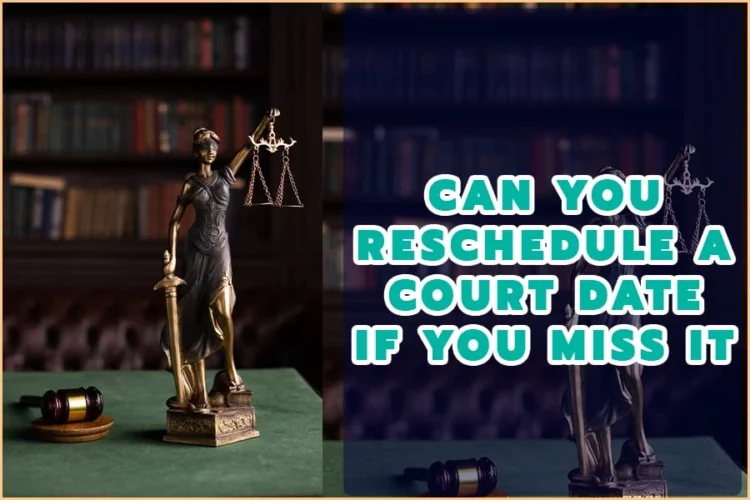The question: “can you reschedule a court date if you miss it” comes up a lot in the legal world.
It can be really scary to miss your court date. You may have a million questions, like will you go to jail? Will you get a warrant for your arrest?
What if there’s a snowstorm and you can’t make it? We’ll answer all of those questions in this article and more.
We’ll discuss what happens when you miss your court date, the possible penalties, how to reschedule, and more. But let’s start by answering the question,
Can You Reschedule A Court Date If You Miss It?
It depends on the court. In some jurisdictions, you can reschedule if you miss your court date. So long as you contact the court beforehand. In others, you may only be able to reschedule if you have a very good excuse for missing.
And in others still, you may not be able to reschedule. To determine whether you can reschedule, you need to look up your specific court’s rules.
What You Need To Know About Court Dates
If you have been charged with a crime, you will have to go to court. However, it can be a daunting experience, especially if you do not know what to expect.
It is important to know what court dates are and what you need to do to prepare. Most court dates are set for a preliminary hearing, arraignment, or trial.
Arraignment
The arraignment is your chance to enter a guilty plea, not guilty, or no contest. When someone is arrested and brought to court, they must go through an arraignment.
It’s the first time the person appears in front of a judge. The arraignment is a chance for the defendant to plead guilty or not guilty and learn the charges against them.
The arraignment also sets a date for the next hearing.
Preliminary Hearing
The preliminary hearing is your opportunity to learn more about the charges against you.
It happens before a trial to determine if there is enough evidence for the case to go to trial. The prosecutor will present evidence to the court. The judge determines whether there is sufficient evidence against you to put you on trial.
If the court finds enough evidence, the case will proceed to trial. Otherwise, if the evidence is insufficient, the court will dismiss your case.
Trial
The trial is your chance to have your case heard by a jury or judge.
A trial is a formal examination of a criminal charge against a person; the person charged is called the defendant.
The prosecutor, who represents the people of the state or federal government, presents evidence against the defendant.
The defendant can have a lawyer to help defend them. The lawyer defends the defendant by asking questions of witnesses and trying to disprove the prosecutor’s evidence.
The government files a “criminal information” or “indictment” against you when charged with a crime. It is a formal document that starts the criminal process that contains:
- The name of the defendant
- The charge(s)
- The date of the offense
- A brief description of the offense
- The maximum possible penalty
- The name of the prosecutor
- A summons; a notice to appear in court
- A waiver of an indictment. It’s a request by the defendant not to use the grand jury to determine the sufficiency of the evidence to charge them.
- If the defendant is not in custody, the criminal information or indictment must be served on the defendant. If the defendant is in custody, the prosecutor will serve it on the defendant.
A trial will be an ongoing case; therefore, there will be different dates you need to appear in court. Be sure to speak to an attorney to learn more about your specific court dates.
You must appear in person when you receive notification of your court date. It is important to show up on time and to dress appropriately.
If you are unsure about what is appropriate, it is recommended to be cautious and dress conservatively.
You will also need to bring any required paperwork with you to court. When you arrive at court, you will need to check-in with the clerk.
They will provide you with further instructions and may tell you to wait in a specific area. The court proceedings will then begin.
During the proceeding, the prosecutor will present their case against you. You will have an opportunity to respond and present any evidence or witnesses on your behalf. After both sides have presented their cases, the judge will decide.
If you are found guilty, the judge will issue a sentence. It may include jail time, a fine, or community service. If you are found not guilty, you will be free to go.
What Happens If You Miss Your Court Date?
When you miss your court date, the consequences can be pretty severe. You could be looking at jail time, a fine, or both. It will depend on the severity of the charge and how high the judge sets your a bond.
Remember that you agreed to attend all your court hearings as part of the bail process. And by going back on your word, you’re breaking the conditions of your bail.
If you miss your court date, there are a few things that could happen:
Bench Warrant
The first thing that would happen is a bench warrant issued for your arrest. It means that a police officer would be looking for you so that they can bring you before the court.
They’ll likely hold you until your court date. In most cases, the court will most likely deny bail.
Contempt Of Court
When a person fails to appear in court as ordered, the court may find the person in contempt of court. Contempt of court is a criminal offense resulting in jail time and a fine.
Generally, it is contemptuous behavior that interferes with the administration of justice. It includes disobeying a court order, insulting or obstructing a court official, or publishing something that could prejudice a trial.
There are three types of contempt: civil, criminal, and direct.
Direct contempt: This happens in the judge’s presence, who will immediately resolve it. It includes verbal insults, speaking out of turn, or refusing to obey a court order. However, this type of contempt is rare; many people are usually well-behaved in front of a judge.
Indirect contempt occurs outside the judge’s presence and may result in a citation or an arrest warrant. It includes such acts as failure to appear in court, publishing information that could prejudice a trial, or destroying evidence.
Criminal and civil contempt are the two types of indirect contempt.
- Criminal contempt of court is a willful act that interferes with the administration of justice. This type of contempt is punishable by law and can result in a jail sentence.
For example, if you fail to pay three alimony payments, the court will find you in contempt and punish you.
- Civil contempt is a willful act that interferes with the administration of justice but does not constitute a criminal offense. It is used to enforce court orders and may result in fines only.
The purpose of civil contempt is to coerce the person into compliance. For example, it could force them to sign papers they initially refused to sign.
Harsher Sentence
Following your contempt of court, the court may also issue a harsher sentence in your ongoing trial.
What To Do If You Can’t Make It To Your Court Date
First and foremost, notify the court as soon as possible. You can do this in several ways: by mail, phone, or online. Most courts have an online system that allows you to submit your notice of absence.
A lawyer will be of invaluable help during this time, so make sure to get one. Your lawyer will get better results in getting the court to reschedule the court date.
Suppose you cannot attend your court date for a legitimate reason (critical illness, family emergency, car accident, etc.).
In this case, you may be able to have the date rescheduled. Again, this depends on the court in which you are appearing.
It may also vary depending on the type of case. In some instances, you may be able to have the case continued without appearing in court.
You may have to appear in person or by video conference in other cases. Check with the court in advance to find out what their policy is.
Conclusion
So, can you reschedule a court date if you miss it? Well, as you’ve seen, it’s not easy nor straightforward. You must have a legitimate reason for failing to appear in court.
The most important thing is to contact the court as soon as possible and let them know of your absence. The judge will consider your proactiveness. However, the court may not always accept your request, so be sure to attend your court date without fail.










